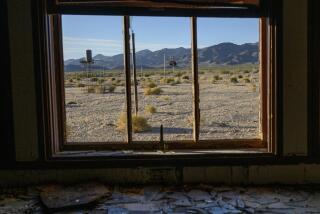Heated arguments
- Share via
Re “Hot times in the city,” Opinion, Sept. 9
I have three words in response to Ali Modarres: wrong, wrong, wrong. He argues that high-density development will worsen the urban heat-island effect. This effect sets in at very low levels of development. The heat island is no worse in high-density downtown than it is in lower-density areas.
The alternative to high-density development is more sprawl -- in the Inland Empire, Orange County and Santa Clarita, for example.
As these areas get increasingly paved with roads and houses, the heat-island effect covers a broader area and therefore gets worse. And that’s not accounting for the increased emissions of greenhouse gases as commuters travel ever-greater distances to and from work.
I applaud the author’s advocacy for creating open space and increasing energy efficiency. But high-density development is essential for improving efficiency and preserving open space.
These goals cannot be achieved if we continue unfettered growth in our sprawling suburbs.
Raphael Mazor
Long Beach
Modarres is correct on some of his assumptions, but he’s missing important pieces to this puzzle. We are tearing down parks for parking lots, and then from parking lots to dense housing.
Where are the native street trees, parkways and grass/sod roofs that reduce urban heat islands? In addition to the increase in parks and native tree species, maybe we can take a page from Curitiba, Brazil, and see how the city designed and zoned its additional park spaces to double as flood banks -- in case of those sudden large storms L.A. seems to get after droughts -- all the while increasing density and improving quality of life for its residents.
Jerard Wright
Los Angeles
High-density development may discourage driving in favor of walking and mass transit, but could the energy savings be outweighed by heating, cooling and lighting large buildings in close proximity?
This is an example of why the government should not be in the business of trying to micromanage the way we produce and consume energy. There are too many complex questions and trade-offs that central planners and regulators cannot possibly sort out.
What’s the answer? Keep it simple. Put a tax on carbon fuels. Market forces will do the energy accounting far more efficiently and accurately than the political process or Atty. Gen. Jerry Brown’s global-warming lawsuits.
Frederick Singer
Huntington Beach
More to Read
Sign up for Essential California
The most important California stories and recommendations in your inbox every morning.
You may occasionally receive promotional content from the Los Angeles Times.













